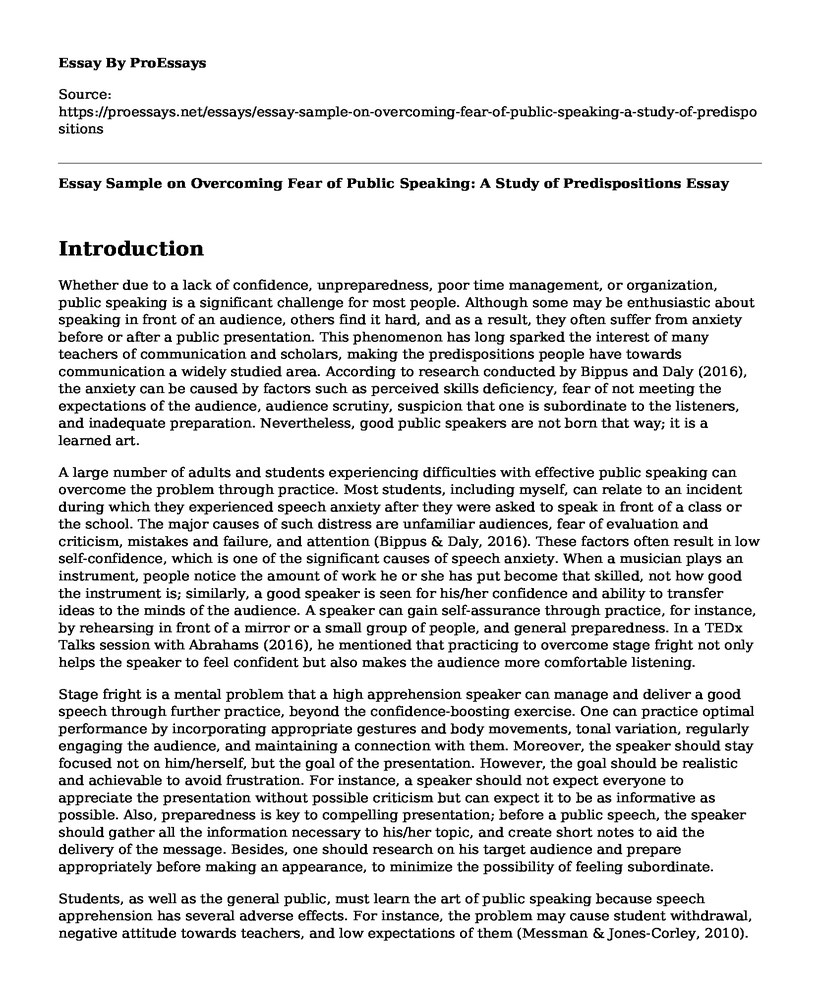Introduction
Whether due to a lack of confidence, unpreparedness, poor time management, or organization, public speaking is a significant challenge for most people. Although some may be enthusiastic about speaking in front of an audience, others find it hard, and as a result, they often suffer from anxiety before or after a public presentation. This phenomenon has long sparked the interest of many teachers of communication and scholars, making the predispositions people have towards communication a widely studied area. According to research conducted by Bippus and Daly (2016), the anxiety can be caused by factors such as perceived skills deficiency, fear of not meeting the expectations of the audience, audience scrutiny, suspicion that one is subordinate to the listeners, and inadequate preparation. Nevertheless, good public speakers are not born that way; it is a learned art.
A large number of adults and students experiencing difficulties with effective public speaking can overcome the problem through practice. Most students, including myself, can relate to an incident during which they experienced speech anxiety after they were asked to speak in front of a class or the school. The major causes of such distress are unfamiliar audiences, fear of evaluation and criticism, mistakes and failure, and attention (Bippus & Daly, 2016). These factors often result in low self-confidence, which is one of the significant causes of speech anxiety. When a musician plays an instrument, people notice the amount of work he or she has put become that skilled, not how good the instrument is; similarly, a good speaker is seen for his/her confidence and ability to transfer ideas to the minds of the audience. A speaker can gain self-assurance through practice, for instance, by rehearsing in front of a mirror or a small group of people, and general preparedness. In a TEDx Talks session with Abrahams (2016), he mentioned that practicing to overcome stage fright not only helps the speaker to feel confident but also makes the audience more comfortable listening.
Stage fright is a mental problem that a high apprehension speaker can manage and deliver a good speech through further practice, beyond the confidence-boosting exercise. One can practice optimal performance by incorporating appropriate gestures and body movements, tonal variation, regularly engaging the audience, and maintaining a connection with them. Moreover, the speaker should stay focused not on him/herself, but the goal of the presentation. However, the goal should be realistic and achievable to avoid frustration. For instance, a speaker should not expect everyone to appreciate the presentation without possible criticism but can expect it to be as informative as possible. Also, preparedness is key to compelling presentation; before a public speech, the speaker should gather all the information necessary to his/her topic, and create short notes to aid the delivery of the message. Besides, one should research on his target audience and prepare appropriately before making an appearance, to minimize the possibility of feeling subordinate.
Students, as well as the general public, must learn the art of public speaking because speech apprehension has several adverse effects. For instance, the problem may cause student withdrawal, negative attitude towards teachers, and low expectations of them (Messman & Jones-Corley, 2010). Therefore, more adults and students need to face the problem of communication apprehension, rather than hide with it.
Excellent public speaking is not an innate talent but an art that can be learned by anyone. Some many adults and students are experiencing difficulties with high communication apprehension but can overcome the problem through practice. The exercises can help to improve confidence and preparedness before a presentation. While public speaking is one of the greatest fears for most students and adults, they should strive to overcome it because it is often associated with negative implications.
References
Bippus, A. M., & Daly, J. A. (1999). What do people think causes stage fright?: Naive attributions about the reasons for public speaking anxiety. Communication Education, 48(1), 63-72. http://dx.doi.org/10.1080/03634529909379153
Abrahams, M. (2018, June 7). Speaking Up Without Freaking Out | Matt Abrahams | TEDxPaloAlto. YouTube. https://www.youtube.com/watch?v=XIXvKKEQQJo
Messman, S., & Jones-Corley, J. (2010). Effects of communication environment, immediacy, and communication apprehension on cognitive and affective learning. Communication Monographs, 68(2), 184-200. https://doi.org/10.1080/03637750128054
Cite this page
Essay Sample on Overcoming Fear of Public Speaking: A Study of Predispositions. (2023, Mar 29). Retrieved from https://proessays.net/essays/essay-sample-on-overcoming-fear-of-public-speaking-a-study-of-predispositions
If you are the original author of this essay and no longer wish to have it published on the ProEssays website, please click below to request its removal:
- Comorbidity of Fibromyalgia and Mental Illness - Research Paper
- Relationship Between Depression and Socioeconomic Status Annotated Bibliography
- Essay Sample on Capitalism and Race
- Essay Sample on The Value of Education
- Essay Sample on Mixed Anxiety/Depression & Substance Use: Effective Diagnosis & Treatment
- Paper Example on Teacher Self-Awareness: Examining Strengths, Weaknesses & More
- Essay Example on Parenting: Learning, Adapting, and Evolving in Challenging Situations







